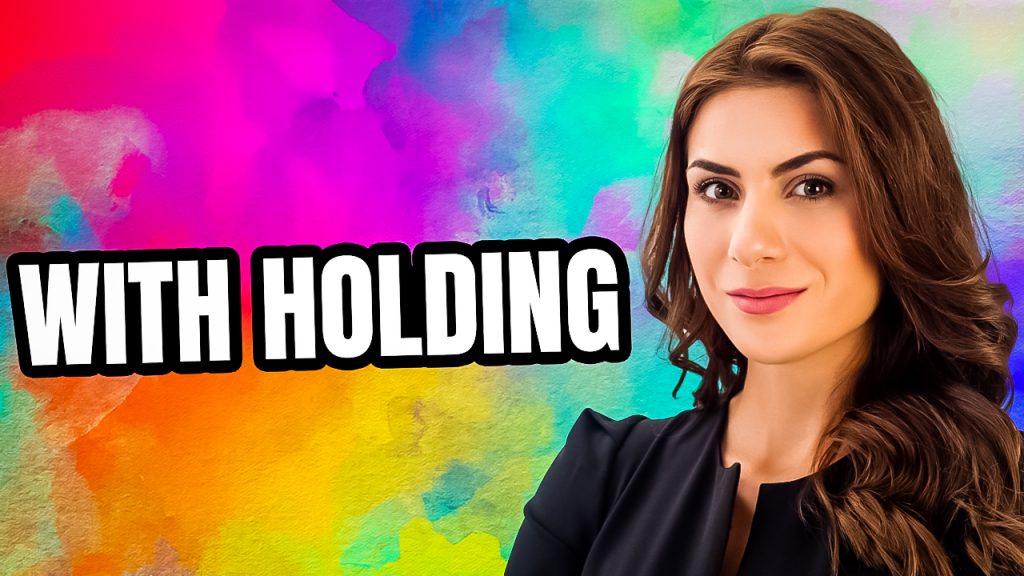What is Withholding?

Withholding refers to the act of intentionally holding back or not disclosing information,
emotions, or other forms of communication that may be relevant to a particular situation or
relationship. This phenomenon is common in both personal and professional settings, and it can
have significant psychological implications for both the person who is withholding and the
recipient of the withheld information.
In psychology, withholding is often seen as a form of passive-aggressive behavior, which is
characterized by indirect resistance to the demands or expectations of others. This behavior is
often rooted in a desire to avoid confrontation or conflict, as well as a fear of being judged,
rejected, or misunderstood. However, it can also be a way of asserting power or control over
others by keeping them in the dark or manipulating their perceptions.
There are many different forms of withholding, and each can have unique psychological effects.
For example, in personal relationships, withholding can take the form of not expressing one’s
emotions or needs, avoiding difficult conversations, or failing to share important information
about oneself or one’s past. This behavior can create a sense of distance and mistrust between
partners, as well as resentment and frustration.
In the workplace, withholding can manifest as withholding information from colleagues,
superiors, or subordinates, or not providing feedback or guidance when needed. This can lead
to confusion, miscommunication, and inefficiencies in the workplace, as well as decreased
morale and job satisfaction.
One of the most significant psychological effects of withholding is that it can erode trust and
undermine relationships. When one person withholds information or communication from
another, it sends a message that they do not trust or respect the other person enough to be
honest with them. This can create a vicious cycle of mistrust and distance, as the recipient of
the withholding behavior may become increasingly guarded and hesitant to open up to the
withholder in the future.
Moreover, withholding can also have a significant impact on mental health. For the person who
is withholding, it can create a sense of guilt, shame, or anxiety as they struggle with the decision
to withhold information or communication. They may feel trapped between their desire to avoid
conflict or rejection and their need for authenticity and honesty in their relationships.
Additionally, for the recipient of withholding behavior, it can cause feelings of frustration, anger,
and sadness. They may feel like they are not being heard or respected, and that their needs or
desires are not being taken seriously. This can lead to a sense of powerlessness or
helplessness, as they struggle to navigate the dynamics of the relationship or situation.
There are several reasons why people may engage in withholding behavior. In some cases, it
may be a learned behavior that they picked up from their family or social environment. For
example, if a person grew up in a household where emotions were not openly expressed or
discussed, they may be more likely to withhold their own emotions in their adult relationships.
Additionally, withholding behavior can also be a coping mechanism for dealing with difficult or
overwhelming emotions. For example, a person who is experiencing anxiety or depression may
be more likely to withhold information or communication in order to avoid triggering those
difficult emotions.
Moreover, withholding can also be a way of asserting power or control over others. In some
cases, people may withhold information or communication in order to manipulate or influence
others to do what they want. This can be particularly damaging in personal relationships, where
it can create a power imbalance and erode trust.
In order to overcome withholding behavior, it is important to first recognize when it is happening.
This can involve reflecting on one’s own communication patterns and being aware of any times
when one may be tempted to withhold information or emotions. Additionally, it can be helpful to
seek out feedback from others, particularly in personal or professional relationships, in order to
understand how one’s behavior is affecting them.
Moreover, it is important to work on building trust and open communication in relationships. This
involves being honest and transparent with others, even when it is difficult or uncomfortable. It
also means being receptive to feedback and actively working to address any concerns or issues
that arise.
In order to address withholding behavior, it can be helpful to explore the underlying reasons why
it is happening. This may involve working with a therapist or counselor to identify any past
experiences or emotional patterns that may be contributing to the behavior. Additionally, it may
be helpful to develop coping strategies for dealing with difficult emotions or situations, such as
mindfulness techniques or stress-management practices.
Finally, it is important to recognize that overcoming withholding behavior is a process that takes
time and effort. It requires a willingness to be vulnerable and take risks in order to build stronger,
more authentic relationships with others. However, the rewards of open and honest
communication are well worth the effort, as they can lead to deeper connections and greater
emotional well-being.
In conclusion, withholding behavior is a complex and multifaceted phenomenon that can have
significant psychological implications for both the person who is withholding and the recipient of
the withheld information. It can erode trust and undermine relationships, as well as create
feelings of guilt, shame, or anxiety for the person who is withholding. However, by recognizing
and addressing this behavior, it is possible to build stronger, more authentic relationships and
improve overall emotional well-being.
This Post is Brought To You By BetterHelp